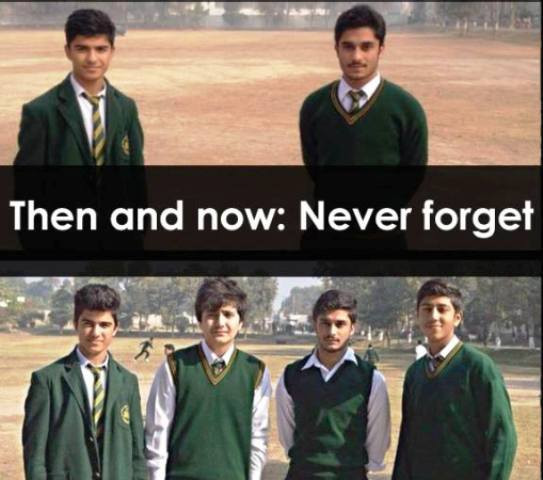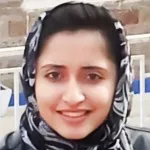I live in Karachi but I was going back home and I was excited.
As I entered the lounge in my house, I saw my mom weeping in front of the television. I couldn’t, for the life of me, understand why. Then I paid more attention to the news blaring in the background and for those few moments, I felt the ground beneath me disappear. I couldn’t breathe.
The news ticker was trying to cope with a number; that number was the amount of students who had been brutally murdered in an attack – an attack that took place at a school. A school in Peshawar. I had to jolt myself back to reality in order to digest the information my brain had just accepted but refused to understand. The people attacked were little kids. Children, teenagers who went to attend school, just like I had. That could have been my school. Those kids could have been me and my classmates. I couldn’t stop imagining myself in place of those children, I couldn’t stop visualising the inhumanity these kids must have witnessed; their teachers and friends were incinerated, beheaded and shot at in front of them. I couldn’t understand how anybody, no matter how barbaric, could have the heart to put little children through such trauma.
We started packing for our journey the next morning, only this time there was no excitement. There was a sinking feeling in my chest; a void inside screaming painfully, forcing me to think of the parents who lost their children, the children who lost their siblings, about those families that had been ruthlessly torn apart.
The next morning, we left for Peshawar. Upon arriving in the city, we drove to my grandmother’s house. Our route, however, was as colourless as a blank canvas; pale, expressionless faces and eyes filled with sorrow. If there was colour, it was in the eyes of the people of Peshawar, and if that colour were to be painted onto a canvas, the canvas itself would cry – such was the pain those eyes beheld. The wind mourned and each ray of sunshine posed the same grey question, why would anyone stoop to such an inhumane level?
Posters of smiling children, children who had been killed in the attack, covered the walls of the city. I asked my uncle to stop at the school. I couldn’t believe what had happened. I had to see for myself. It was around 5:30 in the evening and a large number of army men were standing around the school but I managed to make my way close to the main gate. The sound of nothingness filled the air. I was already grief-stricken but as I stood there, I felt an elevated rush of sorrow altogether. Pictures of the martyrs with bouquets and candles had been placed along the gate. It was then that I couldn’t control my tears. I couldn’t fathom just how hard it must have been for the parents to recognise, register and cope with their loss.
After two days, I met a lady who told us the story of her relative. She said her aunt’s son and daughter were studying at the Army Public School. She explained that on the day of the attack, when the son heard the firing, he ran towards the main gate and even made it there successfully, only to realise that his sister was still inside the school. He went back to rescue her. His sister made it out alive but she came without her brother. He had been shot in the head.
Death doesn’t carry a calendar and no one has been able to contemplate the gambling of fate. One of my Bhabi’s (sister-in-law) aunts also told us the tale of how her son escaped. When he heard the firing, he was on the third floor of the building. He somehow managed to climb down the balcony and escape from the back of the building. One of my aunt’s nephews witnessed the entire scene from the opening in the washroom’s ventilator; he is undergoing psychotherapy now.
During my two week stay in Peshawar, every day I heard of such incidents. Then a few days before coming back to Karachi, I asked my uncle to take me back to the school one last time. When I got there, I saw a woman standing by the main gate, staring at the building. Wondering how they gave her permission to get so close to the main gate, I inquired about her from a soldier. He replied saying,
“She is one of the mothers whose son died in the massacre and if we deny her of anything, she reacts violently.”
He told me that the lady would visit the school every day and ask,
“Chutti shwi? Os ba zamaa bachey razi.”
(Is the school time over? My son will come out now.)
That is why they had given her permission to go near the building for half an hour every day. After a little while, she would go back home herself, but she would come again the very next day, the very same time.
On the day we were travelling back to Karachi, I met one of my uncle’s colleagues at the airport. She told us how her relative, a small child, saw other kids being shot one by one and he had to hide under one of his friend’s bodies, pretending to be dead so he wouldn’t be killed. Unfortunately, he moved his leg from underneath the bodies and the attackers fired five bullets right at it. They wanted to make sure no one was live. While the child did manage to escape, he managed this with a broken heart, a scarred soul and a tattered leg.
On my way back to Karachi, I had realised that while I may have physically been present on the plane, I knew that my heart was not with me. My heart was no longer my own, my heart had gone out to every individual who had suffered a loss through this tragedy, my heart went out those who survived it and my heart went out to Peshawar, my home.
On January 12, 2015 the schools and colleges were to reopen. When I woke up and was getting ready for college, the APS attack was still on my mind. I kept thinking about those students who had escaped the atrocities and were probably getting dressed for school just the way I was. I tried to imagine what they must have been thinking...
If I were in their place, would I not cry, scream and question my parents about sending me back to the same place that was a real life nightmare? Would I cry and tremble with fear every time I would hear a loud noise? Would I be able to pass through the school corridors without noticing the pungent smell of death surrounding me; the smell of my teacher being burnt to death right before my eyes? Would I be able to hear the sound of the bell ringing without also hearing the sound of the children screaming and crying in pain and fear? Would I be able to concentrate on the words on our classroom blackboard without first visualising the faces of my friends being horrifically torn apart and hunted down by those barbarians? Would I be able to ignore the scent of new paint only to be reminded of the red blood that was splattered all over it? Would I be able to imagine this school as a school and not a graveyard?
I was still consumed in these thoughts when I reached the entrance of my college; Rangers stood on guard with huge weapons in their hands. The sound of death hanging in the air was palpable and exceedingly disturbing; this time when I entered college, that feeling of security and safety that I used to feel had disappeared. All I could think was what if, God forbid, attackers entered my college? What would I do? Would I run or just freeze? Would I get shot or would I survive? Would anyone come to save me?
While thoughts like these nagged at me the entire day, another thought I had was that of the children going to the Army Public School in Peshawar that same day. While I sat, far away pondering over the answers to so many of these questions, those brave souls attended the first day of school after the attack. They went in there with a renewed sense of hope. Yes, they must have been scared, they must have been petrified, but they were all there. They stood up to face that bright new day, with all its ambiguity and uncertainty. They stood up to face that risk, to challenge those attackers and to make our country proud. It is that kind of resilience that Pakistan needs. Not the kind that forgets that the attack took place. Not the kind of resilience which means ‘moving on’ from the attack. We need the kind of resilience that stands up in the face of adversity and challenges its very being. That is the kind of resilience we need. That is what Pakistan needs to learn from the Peshawar attack.



COMMENTS
Comments are moderated and generally will be posted if they are on-topic and not abusive.
For more information, please see our Comments FAQ